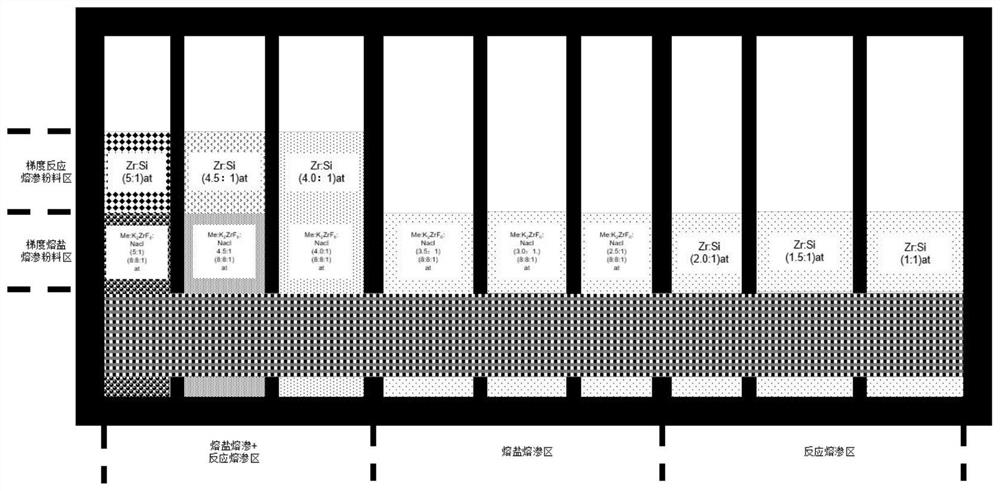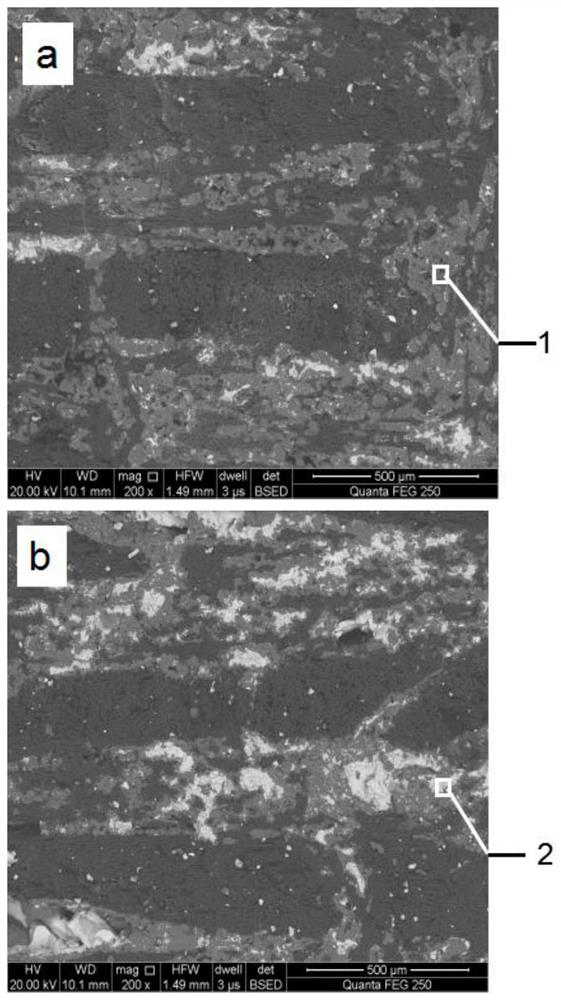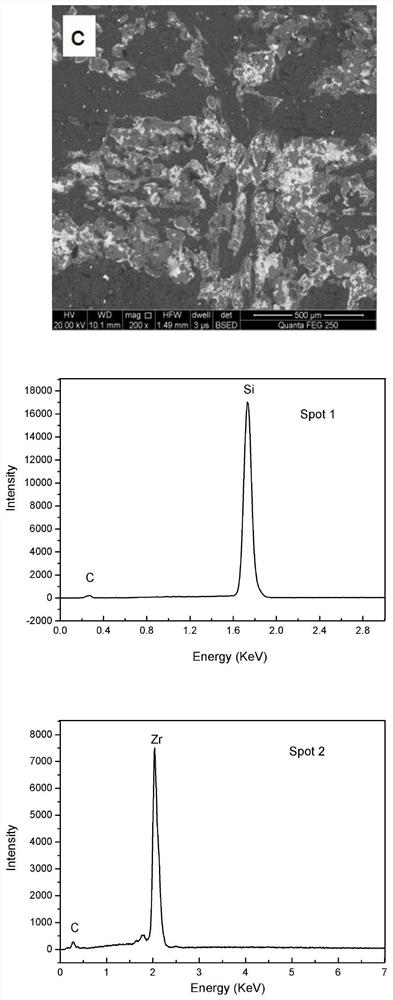Preparation method of component- gradient -controllable multi-element ultrahigh-temperature ceramic modified C/C composite material
A technology of ultra-high temperature ceramics and composite materials, which is applied in the field of preparation of multi-element ultra-high temperature ceramic modified C/C composite materials with controllable composition gradient, which can solve the problems of reduced mechanical properties, improve heat insulation performance, reduce inert weight, The effect of ensuring mechanical strength
- Summary
- Abstract
- Description
- Claims
- Application Information
AI Technical Summary
Problems solved by technology
Method used
Image
Examples
Embodiment 1
[0046] Such as figure 1 As shown, it is a schematic diagram of the placement of the graphite tank body and the powder used in this embodiment. The graphite tank body is a hollow cube, and 8 pairs of slots are sequentially opened along the length direction of the cube, and graphite plates are inserted in the slots. The graphite tank body is divided into 9 sections, from left to right, the 1st-3rd section is the front end area, the 4th-6th section is the middle end area, and the 7th-9th section is the rear end area.
[0047] (1) Add 1.2g / cm 3 The C / C composite material is polished and cleaned with absolute ethanol, and placed in an oven at 100°C for 12 hours for later use; the particle size of Zr and Si metal powders are both <200 mesh, and mixed with alcohol according to the set atomic ratio. Dry and sieve after mixing in a drum type ball mill for 12 hours for subsequent use;
[0048] (2) First, lay Zr-Si mixed common reaction infiltration powder and K 2 ZrF 6 Zr-Si mixed m...
Embodiment 2
[0053] Adopt the graphite tank body of embodiment 1 and the placement mode of powder:
[0054] (1) Add 1.2g / cm 3 After the C / C composite material is polished and polished as a whole, it is washed with absolute ethanol, and placed in an oven to dry for 12 hours at 100°C for use; the particle size of Hf and Si metal powders are both <200 mesh, and they are mixed with alcohol according to the set atomic ratio. Dry and sieve after mixing in a drum type ball mill for 12 hours for subsequent use;
[0055] (2) Firstly lay Hf-Si mixed ordinary reaction infiltration powder and K 2 ZrF 6 Hf-Si mixed molten salt infiltration powder doped with alkali metal salt, and K 2 ZrF 6 Hf-Si mixed molten salt infiltration powder doped with alkali metal salt, Hf-Si mixed ordinary reaction infiltration powder is laid on the bottom plate of the graphite tank in the 7th-9th section, and then the C / C composite material is placed on Inside the graphite tank, insert the required graphite plates on bo...
Embodiment 3
[0060] like Figure 4 As shown, it is a schematic diagram of the placement of the graphite tank body and the powder used in this embodiment. The graphite tank body is a hollow cube, and 8 pairs of slots are sequentially opened along the length direction of the cube, and graphite plates are inserted in the slots. The graphite tank body is divided into 9 sections, from left to right, the 1st-3rd section is the front end area, the 4th-6th section is the middle end area, and the 7th-9th section is the rear end area; in this embodiment, each section The amount of powder placed is the same as in Example 1. The scheme of Example 1 is a one-step molding process, while the second scheme of this example is a two-step molding process. The difference in the way of powder placement is only the K in Example 1. 2 ZrF 6 Lay together with alkali metal salt doped Zr-Si mixed molten salt infiltration powder and Me-Si mixed common reaction infiltration powder, and K in this embodiment 2 ZrF 6 ...
PUM
| Property | Measurement | Unit |
|---|---|---|
| density | aaaaa | aaaaa |
| porosity | aaaaa | aaaaa |
Abstract
Description
Claims
Application Information
 Login to View More
Login to View More - R&D
- Intellectual Property
- Life Sciences
- Materials
- Tech Scout
- Unparalleled Data Quality
- Higher Quality Content
- 60% Fewer Hallucinations
Browse by: Latest US Patents, China's latest patents, Technical Efficacy Thesaurus, Application Domain, Technology Topic, Popular Technical Reports.
© 2025 PatSnap. All rights reserved.Legal|Privacy policy|Modern Slavery Act Transparency Statement|Sitemap|About US| Contact US: help@patsnap.com



